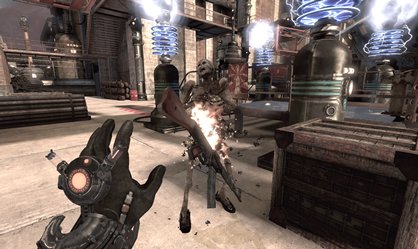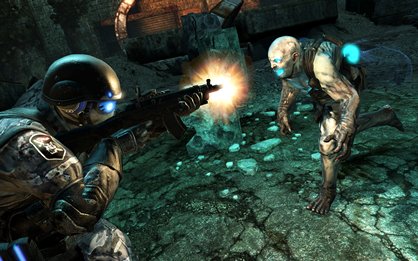Singularity
Time-twister, or time-waster?
Nowadays it takes an incredibly honest developer to stand up and admit the game they’re working on takes fewer than eight hours to complete. It’s been a long time since we’ve heard predictions below twice that number. Applying normal PR logic (half the stated game time, then add a quarter), Singularity will actually clock in at around five hours. More likely, senior producer Brian Pass has refused to inflate his estimate with lies and has given us honest answers. Incredible, we know, but our latest Singularity chat was refreshingly PR filler-free.

“Singularity comes out of the Raffel Brothers’ [Raven Software’s founders] wish to make a game inspired by their childhood,” Pass explains. “They grew up in the Cold War and were fascinated by the out-there technologies developed by the world superpowers. They also loved exploring, and lived next to a factory called Badger Ammunition. By the time they’d grown up, Badger Ammunition had closed, but they always dreamt of exploring it and old places just like it.”
Singularity is Raven’s chance to do just that, with extra time-bending goodness chucked in for kicks. Part puzzler, part shooter (with a giant leaning towards the latter), Singularity is a simple blend of BioShock and Timeshift set on an abandoned Russian research island. Understandably Raven are very keen to stress similarities with one of those games more than the other.
Singularity is split into chapters, each weighing in at around an hour apiece and available to replay individually once complete. And we can see ourselves returning to some of them, particularly the level set on a newly resurrected tanker called The Pearl which rapidly reverts back to rust and ruin and tries to take you to the grave with it.

Though locations are often awe-inspiring, combat is somewhat less so. Singularity’s fights, though not shambolic, are far from genre-leading. Your main piece of equipment is the Time Manipulation Device, or TMD for short. It’s a multi-featured tool, letting you rewind and fast-forward time, grab items out of time altogether (a held grenade will never explode if it’s been ripped out of your standard timeline) and fire impulse blasts at enemies. Encounter an enemy and your first reaction will always involve testing the TMD. If that fails the gunplay is only effective to a point.
Weekly digests, tales from the communities you love, and more


